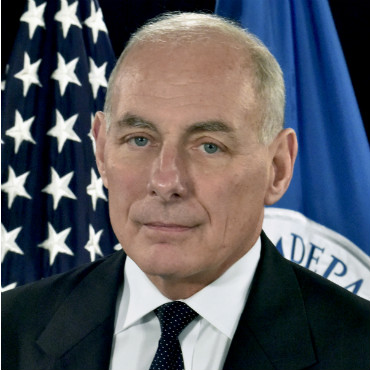DHS chief doubles down on critical infrastructure designation for voting systems

In the wake of a leaked intelligence document describing Russian attempts to hack voting systems, DHS Secretary John Kelly reiterated his support for providing election systems with federal protection.

Department of Homeland Security Secretary John Kelly
In the wake of a leaked intelligence document describing Russian attempts to hack voting systems, Department of Homeland Security Secretary John Kelly doubled down on maintaining the designation of voting systems as critical infrastructure.
Kelly told the Senate Homeland Security and Governmental Affairs Committee on June 6 that despite pushback he’s received from state and local election officials -- as well as “many members of Congress” -- he would support the designation put in place by his predecessor Jeh Johnson.
“I don’t believe we should” back off on the critical infrastructure designation, he testified, adding that he plans to meet with state officials next week to further discuss how DHS can make sure states’ election systems are protected.
“We’re here to help,” he said. “There is nothing more fundamental to our democracy than voting.”
Johnson made the formal designation Jan. 6 in response to allegations of Russian hacking aimed at state election and voter data systems. The designation guarantees states priority in DHS assistance requests and greater access to information on cyber vulnerabilities. Johnson and Kelly have both stressed that such federal assistance is voluntary.
Committee ranking member Sen. Claire McCaskill (D-Mo.) added her support for maintaining the critical infrastructure designation, reasoning that “it would be distressing if the United States would then pull back from the ability to help states protect these voter files, and [DHS is] going to be in the best position to do that.”
“I like that our elections are decentralized,” she said. “On the other hand, this was Russia.… This was an international attempt to impact the elections of the United States of America.”
Kelly’s support of the designation and McCaskill’s comments follow the arrest of a government contractor for allegedly leaking a classified National Security Agency document to the online publication The Intercept.
The leaked document, dated May 5, details Russian cyber espionage on an election software vendor and spear-phishing attempts against local election officials in the lead-up to the November 2016 presidential election.
On June 5, The Intercept posted a redacted copy of the NSA document, prompting a government investigation and ultimately the arrest of 25-year-old Reality Leigh Winner, the contractor who made the leak.
While condemning the leak, McCaskill said, “we now have, in the public domain, verified information that the Russians made an aggressive attempt to access not only a vendor of voter software in this country, but also a number of states -- the voter file databases -- in the month prior to our election.”
“Whether or not they accessed the tabulation, it’s clear they were trying to get into voter files. And I don’t think they were going there to try to just hang out,” she said. “I don’t think enough attention has been given to something that is [DHS’s] responsibility … critical infrastructure, including the election systems.”
McCaskill asked Kelly directly what role DHS would play in the investigation of “the attempts to penetrate the voter files in this country immediately before the election by the Russian government.”
While he declined to publicly “confirm or deny” anything in the documents, Kelly testified that he shares McCaskill’s concerns about “the sanctity of our voting process,” and he confirmed that DHS will participate in an investigation of the election hacking described in the documents.
“Clearly, it should be an interagency investigation, and that is taking place,” Kelly said. “DHS will be a part of that.… We are involved.”
NEXT STORY: White House funds federal spectrum study


